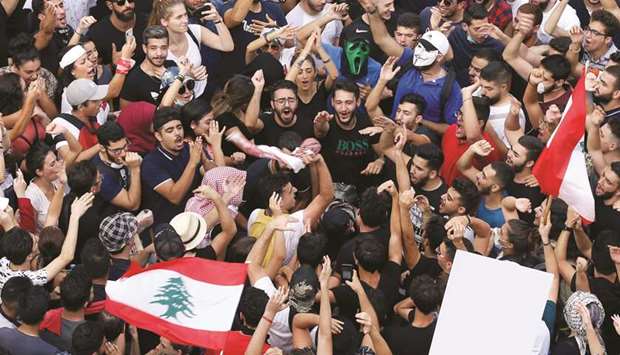Thousands of Lebanese demonstrators vowed yesterday to continue their protests against austerity despite assurances by Prime Minister Saad Hariri that his government will work to solve the country’s festering economic woes.
Hariri gave a 72-hour deadline to his partners in the government to agree on a solution to the economic crisis, which has triggered mass protests across Lebanon.
“There is a short period of time for our partners in the government to start working,” Hariri said yesterday in a televised speech as anti-government protests were under way in different parts of the country for the second straight day.
Hariri added that Lebanon has to implement badly needed reforms to heal its economy.
He accused unnamed political parties of hampering the implementation of reforms that international lenders deem crucial.
Hariri’s remarks came shortly after Lebanese Foreign Minister Jubran Bassil said the government must not impose new taxes and should carry out drastic reforms.
Bassil urged protesters to allow the government until next week to finish discussing the 2020 budget.
“The current alternative is very foggy,” Bassil, who is the son-in-law of Lebanese President Michel Aoun, said in a televised statement. He accused some domestic parties of exploiting the protests to achieve their goals of toppling the presidency, the government and parliament. Some protesters were unimpressed by the latest promises.
“They always give us false promises,” said 50-year-old Marie at a protest in central Beirut. “They should know we’ve lost confidence in them,” Ahmed, a taxi driver, said.
Mahmoud, 27, said he had been without a job for the past year. The outbreak of protests against the government’s economic policies, which started late Thursday, has led to mass closure of shops, businesses and schools across Lebanon.
The Education Ministry said schools and universities will remain closed today.
Protesters defied a heavy army presence in the evening as they moved towards a road leading to the presidential palace, where Aoun resides.
Riot police dispersed protesters in downtown Beirut by throwing dozens of tear gas bombs as they vandalised and broke windows of shops in the area.
“Leave. We do not want your rule any more,” the protesters chanted. Earlier in the day, some demonstrators burnt a picture of Aoun, while others vandalised an office belonging to lawmaker Ali Bazi, in southern Lebanon, witnesses said.
Other groups blocked a main highway leading to the Beirut International Airport.
Some passengers were seen walking with their luggage trying to reach the airport on foot.
An unspecified number of people were meanwhile injured after bodyguards of an ex-lawmmaker in the port city of Tripoli fired on protesters following a scuffle, private Lebanese broadcaster MTV reported.
Two of those injured later died in hospital, the television report added. There was no immediate official comment.
Lebanon’s protests were sparked by an unpopular proposal to introduce fees for users of messaging apps such as WhatsApp. Telecommunications Minister Mohamed Choucair announced overnight that he would cancel the new charges.
Protesters in eastern Lebanon set up tents in the middle of the street, while burned wood and garbage bins lay around the capital Beirut. Many major roads were blocked. Several Arab embassies have called on their citizens to leave Lebanon.
The Saudi embassy has reserved a seaside hotel for nationals from the kingdom who plan to leave Lebanon, according to Lebanese media.
Lebanese citizens have been suffering from dire economic conditions in the heavily indebted country and from tax hikes, with anti-government protests erupting several times in recent months.
Lebanon is under pressure from the World Bank and the International Monetary Fund to take austerity measures in return for financial support.
The country has one of the biggest public debt ratios in the world, equivalent to about 150 per cent of gross domestic product (GDP).

Demonstrators gesture and chant slogans during a protest over the deteriorating economic situation, in Beirut, yesterday.
